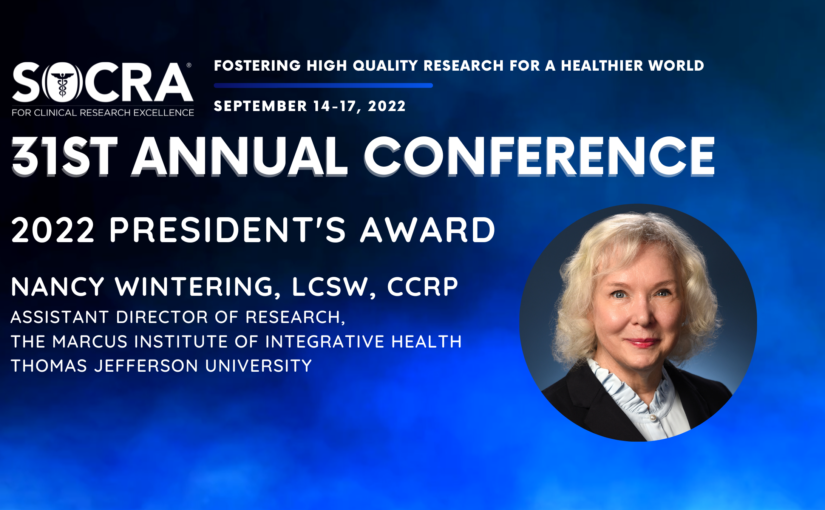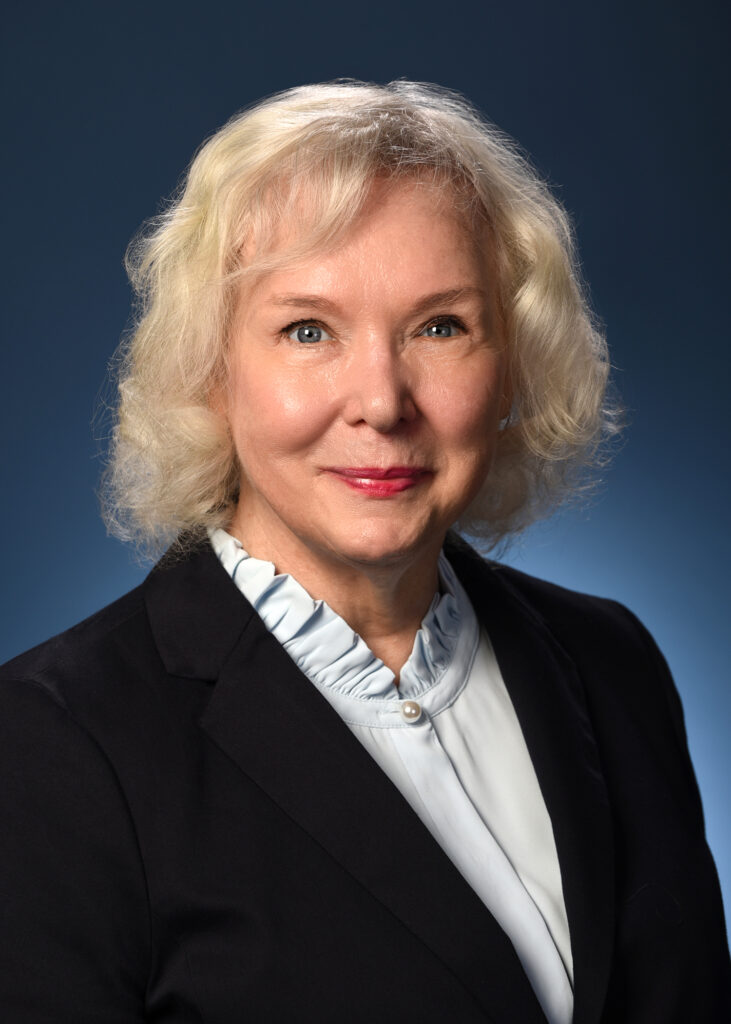From September 14 to September 17, 2022, our global clinical research community will gather virtually for SOCRA’s 31st Annual Conference to enjoy an engaging learning and networking experience to promote safe, efficient, and high-quality clinical research.
At the event, we will honor this year’s President’s Award recipient Nancy Wintering, MSW, LCSW, CCRP, for outstanding service and dedication to SOCRA’s mission. Nancy is the Assistant Director of Research for the Marcus Institute of Integrative Health at Thomas Jefferson University. Nancy has served SOCRA in many ways, including as a past board member, SOCRA Source Journal author, Annual Conference speaker and session chair, workshop and conference organizer and speaker, and poster presenter.
We caught up with Nancy to discuss her thoughts on clinical research, SOCRA, the future, and much more. Read on for interesting insights and perspectives in this inspiring interview.
SOCRA: What does receiving the 2022 President’s Award mean to you?
NW: I am honored to receive this year’s SOCRA President’s Award. This recognition has allowed me to pause, reflect, and summon my gratitude to revivify my passion for continuing to persevere. I am grateful for all I have learned and will learn in future curriculums and annual conferences and workshops, to expand and deepen my knowledge and my personal and professional growth.
I am so grateful to the many colleagues and members who have contributed so much to clinical research. For every new drug, device, and therapeutic intervention, the research team is there, behind-the-scenes, working diligently and often without much public recognition.
SOCRA: Who inspired you to seek a career in clinical research?
NW: My gratitude, inspiration, and passion for research can be attributed to my maternal great-grandmother. In reflecting upon my journey into the field, I recall, as a young woman spending an afternoon with my elderly great grandmother. She was extraordinary. In an era when Sigmund Freud viewed children’s failure to thrive as a manifestation of failed child development, he blamed the family for a child’s condition. My great grandmother was grateful that her family rejected those psychodynamic theorists and instead sought a medical explanation for her condition. In the late Victorian era, she was among the first children to be studied with what was then called Juvenile Diabetes. The children often saw the doctor together, and their illness and disease progression were monitored over time while they were placed on a near-starvation diet in hopes of curtailing the progression of the disease.
During our afternoon together, my great grandmother shared journal articles from her childhood. She showed me images of herself alone, and images of the children involved in diabetes research who were lined up as a group in “before” and “after” photos. The children were not identified by name, yet she remembered them all. She looked back at those childhood images and reflected as she pointed to the photographs. She indicated things like, “This one died as a child,” “This one became very sick,” “This one stopped coming after a while,” “We don’t know what happened to her, but I know she lived,” and “I was in touch with this girl until after we were both married.”
My great-grandmother credited her life to the dedicated research doctors and her parents for their hope, courage, and perseverance. She lived a very, very, long life. From shortly after 1922 when insulin was used in the first human studies, and for the rest of her life, she maintained her twice-a-day insulin regimen and managed her diet well, only enjoying one lemon sugar cookie a month. If it were not for her, in more ways than one, I would not be here today.
SOCRA: What issues drive your passion for clinical research?
NW: I am a social worker at heart, and social justice is on my hard drive. We must continue to take action for social change and social justice. Therefore, instead of criticizing people on their identity politics and placing blame elsewhere, I support our speakers and subject matter experts who expand our SOCRA conference curriculum to be more inclusive in these areas. Topics like health disparities and non-compliance foment substantive discussion and self-reflection.
“Advocating for and educating on inclusion and diversity and understanding the social determinants of health and inequity in the Health Disparities Track is an important topic for clinical research practice and SOCRA programming.”
-Nancy Wintering
SOCRA: How has your career evolved over the years?
NW: Throughout my career, I have held many roles and responsibilities. I have attempted to climb the career ladder laboriously while learning from my mistakes and moving forward. I have tried to view the research experience from the multiple perspectives of the patient and the clinician, and as a dedicated researcher.
I focus on the need for good study designs that reduce the burden on study participants whenever possible. The hallmarks of my practice always include the protection of human subjects and the collecting of good quality data. I value the time and effort involved in the research enterprise. At one point, I decided to take ownership of my career, and not to rely on my employer to challenge me, and I tried to create opportunities for professional and personal growth and fulfillment. I took the perspective that I had a significant role in charting the course of my future. It was and is up to us to show initiative and self-reliance to have an impact through our work.
SOCRA: How has your involvement with SOCRA impacted your career?
NW: SOCRA has played an integral part in my career. From my first contact with SOCRA members, I felt supported and encouraged. On the eve of taking the CCRP exam, I was welcomed by four outstanding SOCRA leaders. As we spoke over dinner, Lisa Benson, Helen Darwin, Susan Devine, and Donna Headlee encouraged me to see this exam as the first step of a journey. They told me about the beginning of SOCRA, evolving from a small group of oncology research data managers into what it is today.
Those leaders continue to be great sources of knowledge and inspiration for all of us. They encouraged me to develop and pursue my contributions to the field of research and to SOCRA, with courage and tenacity. I have tried to live up to their expectations and to be worthy of their commitment to SOCRA. I observed, then and now, relative to the leadership roles in society, among the SOCRA leaders and members, that there is a preponderance of strong, intelligent leadership from whom I can learn and who I can emulate.
SOCRA: How have the events of the last few years shaped your vision for clinical research?
NW: These last few years have been challenging, to say the least. Many of us have lost family members, friends, or colleagues or have been impacted directly or indirectly by COVID-19 in many ways. We have been called upon to innovate and anticipate significant changes in our personal and professional lives. As we move forward into a tentative and somewhat unknown future, we do not know what shape or form our work will take. Nevertheless, I am inspired by the determination and tenacity of the clinical research profession and those who persevered throughout the pandemic. I admire the self-sacrifice and courage of our fellow clinical and research colleagues.
At the same time, these last few years have brought to the forefront the impact of racism and health inequity in our society and our need to critically evaluate our values, systems, practices, and institutions. Allowing any inequities to continue, as if it is someone else’s duty to resolve, lessens all of us and impacts our best efforts for improvement. In today’s world, our values and our professions must continue to be transformed.
“It is our challenge and responsibility to overcome racism and health inequity and to use our platforms as a research community to challenge any forms of implicit or explicit bias or discrimination.”
– Nancy Wintering
SOCRA: What can the SOCRA Annual Conference attendees expect from your upcoming presentation?
NW: One of the goals of my presentation is to have listeners think ahead and anticipate changes in our education and research practice, including being attentive to regulatory and guidance document changes. This idea inspired the concept behind my presentation, “Disseminating Research Results to a Broad Audience: Let’s Give Them Something to Talk About.” I will discuss writing for impact more inclusively for a lay audience and, to share results using Good Lay Summary Practice. We are in the midst of an ever-evolving technology revolution. The speed with which information is developed, collected, and disseminated continues to progress at an increasingly rapid pace. In our lifetimes, we have seen significant developments and advances in clinical research as science has evolved; and as technology has advanced and the means of global communication enhance clinical research conduct. It is essential to share information in a format that laypersons can understand. Research results are no longer only of interest to the scientific community. Our work could not go on without the partnership with patients and research subject populations.
“It is important to conduct research with greater transparency, access, and accountability to the public”
– Nancy Wintering
SOCRA: What is your advice to fellow and aspiring clinical research professionals?
NW: Clinical research is not just a job – it’s a vocation. My advice is to consider your strengths and aspirational goals, then chart a course for your own life. What are the milestones? What do you want to contribute or achieve? It’s important to understand your expectations and how your role fits into the scheme of things.
At the same time, I like believing in one’s life narrative where there are an infinite number of possible outcomes and trajectories. It is possible to develop concurrent pathways toward an unknown future.
“Whether we are in pursuit of social justice or gaining a better understanding of diseases or disorders, we should not be content with the status quo. We should push beyond the limits of our current understanding. The future is entrusted to our own hands.”
– Nancy Wintering
SOCRA: What are you looking forward to in the future?
NW: I’m excited to work with so-called Millennials. I think intergenerational communication while working on joint projects is so necessary and mutually beneficial. I have learned much from persons who are computer natives whose world view has been shaped along with technological advancements. For me, leadership involves collaboration and reciprocal learning. When we think about cultural diversity, it not only refers to race, socioeconomic status, or country of origin. Such diversity also includes intergenerational and multicultural differences. Embracing our differences, working together, and learning from each other can only help improve and expand the impact of our work.
SOCRA: As we wrap up, do you have any final thoughts?
NW: I am very grateful to Erich Lukas, Executive Director of the SOCRA organization, for his mentorship. He has enabled me to give voice to so many of my concerns and interests. Thank you also to the SOCRA staff, past and present, and Anne Howell, the unsung heroine who gets all of us speakers into compliance and to the stage. Additionally, I am grateful to Dr. Andrew Newberg, with whom I have worked for the last 20 years; his support and encouragement have enabled me to continue my growth and development. Also, many thanks to the SOCRA Board and Presidential leadership, past and present.
To learn more about the 2022 SOCRA Annual Conference or SOCRA membership and benefits, please get in touch with us or call (215) 822-8644.


Congratulations Nancy. Thanks for your commitment and all you have done and continue to do for SOCrA and advancing public health. Looking forward to the conference and your presentation. Also, the device track is always awesome. Again, congratulations and well deserved.
An excellent interview delivered by a well-deserved recipient. Congratulations, Nancy!